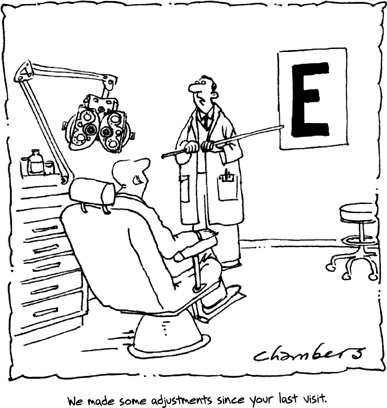Dogs lead a nice life.
You never see a dog with a wristwatch.
GEORGE CARLIN
It’s a funny thing, this getting older. Okay, maybe not so funny. But interesting. It’s an adventure unlike anything we’ve experienced before. For one thing, our bodies aren’t what they used to be. We have to stretch before playing checkers now. We get winded looking at staircases. To make matters worse, those same bodies have simply stopped taking directions. In fact, they’ve gone on strike. “Feed me,” they whimper, “and I will think of serving you again. Feed me large hampers full of cholesterol-stuffed ham and red meat.”
Since the age of three I have played ice hockey. But lately when I play, my mind screams at me, saying, “Go get the puck, you fool! It’s right there in front of you!” Meanwhile, my body hollers, “I bet Ed’s Diner will be open after the game. They serve those nachos with that cheese-flavored lard! Besides, there is a younger guy who wants the puck worse than me. Let him have it!” And my mind, which doesn’t hear so well anymore, repeats the words, “Let him have it”—and my body, which rarely follows directions, finally decides to. So I shish-kebab the younger guy with my hockey stick.
The forgetfulness problem is an interesting one too. Recently, at a large gathering, I introduced myself to the same person twice within the space of three minutes.
“But we just met,” he said, this younger guy with a razor-sharp mind.
“Aha,” I replied, “I was testing you.”
Perhaps you’ve done something similar. You meet someone you haven’t seen since high school and want to introduce him to your spouse. You say, “Honey, this is, um…a dear friend of mine from…uh…high school. We were in, uh…a class together. I sat next to him three years in a row… Yes, we were best friends… He was best man at our wedding…and, uh… Do either of you need more punch?”
There are three things we need to remember when it comes to forgetfulness:
1. Our minds are like sponges, but they also leak.
2. The part that doesn’t leak isn’t of much use.
As early as ninth grade, our brains begin to accumulate junk—years and years of completely useless information—which includes jokes told during recess and the lyrics to seventies songs. Almost every day people ask me important questions about history, about the Christian life—sometimes on radio or national television—and though I am trying to access file folders stored in my brain since youth, all I can think of is a lyric swirling round and round, a lyric I am not making up:
Drop kick me, Jesus, through the goalposts of life…
Straight through the heart of them righteous uprights.
Country songs are to blame for the mass migration of most of my thoughts at vital moments. I cannot count the times I have racked my brain for an important nugget of information, such as where a particular Bible verse is found, where I parked my car, or whether I brought my wife with me to the mall, only to find lurking there a song I first heard in the eighth grade, something like “Folsom Prison Blues” or anything by Tammy Wynette. Just this morning I woke up to discover that “Counting Flowers on the Wall” by the Statler Brothers was going round and round as I shaved. I had not thought of the song for at least twenty-four years.
Smoking cigarettes and watching Captain Kangaroo
Now don’t tell me, I’ve nothing to do.
Perfectly good brain cells were wasted on these things, and if I could go back to high school (and there are teachers who insist I should), I would keep the radio off and study more important things, like how to remember the guy’s name who sat beside me those three years in a row.
They say that fifty is the new forty, that thanks to modern science and medicine and things like liposuction, we are taking much longer to look our age now. And they are probably right. This chart, however, which is based on a study I considered conducting, shows that the decades are distinctly dissimilar (a completely useless and redundant word I learned in high school and can’t forget):
Some consider another birthday to be a millstone. I consider it a milestone, a reminder of the fact that we are one year closer to Home.
Perhaps one of the greatest benefits of reaching middle age is that I can look back through the years with a little wisdom. When I do, I realize that I seldom remember what I was told, but I seldom forget what I experienced. And what I have experienced is this: Through all of the bends and the twists of life, God has not abandoned me for a single solitary second. All I have seen through the years teaches me to believe Him for all I have not seen. It’s something I hope you and I never forget.
And I hope you are still sharp enough to notice that I had no third point about forgetfulness.

